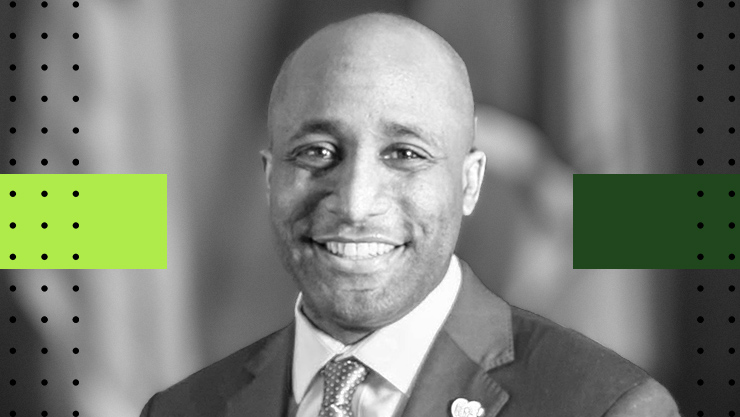
Future of Infrastructure:
Be Obsessed with Delivering the Basics
with Mayor Justin M. BibbHow infrastructure investments can help cities deliver for their residents and build trust

Episode 27: Future of Infrastructure: Be Obsessed with Delivering the Basics
Public Sector Future
Episode summary
Changing the face of Cleveland’s lakefront has been a long-term project. Cleveland Mayor Justin Bibb joined Jeremy Goldberg in our latest Future of Infrastructure episode to talk about the importance of building trust and equity by investing in infrastructure like the lakefront and getting the basics right.
Listen to this episode on any of these podcast platforms:
Changing the face of Cleveland’s lakefront has been a long-term project. Cleveland Mayor Justin Bibb joined Jeremy Goldberg in our latest Future of Infrastructure episode to talk about the importance of building trust and equity by investing in infrastructure like the lakefront and getting the basics right.
What drives change in an American city?
Mayor Bibb finds inspiration in the voices of the residents he serves, in the will of the people of Cleveland. But he can’t improve the city on his own.
“It truly takes every sector to uplift an American city, particularly a city like Cleveland, given the structural challenges that we inherited on day one when taking office.” Bibb continues, “and if we learn anything throughout this pandemic it’s that government alone can’t solve these problems.”
Listening to the community
Bibb believes in the power of listening to his residents in the same way a business would listen to their customers.
”Always listening to your customer, the residents that you serve, centering our work on equity, those two things are important because if you listen and center the work around equity and justice, then I believe we are truly getting at the heart of making sure that what we do actually improves the lived conditions of the residents that we’re trying to serve.”
While it’s important to innovate and think outside of the box at times, Bibb would argue that delivering on the basics is even more vital:
“We have to be obsessed about always improving basic city services. We can talk all day about criminal justice reform and inclusive economic development and smart and connected cities. Those things sound great, but if the potholes don’t get filled – if the snow is not removed, if leaves aren’t picked up, if we can’t, you know, have curbside recycling, then residents don’t have faith that government works for them. And so, you must always be obsessed with investing and delivering on the basics.”
Will improving the most basic city services in Cleveland finally put it “on the map” so to speak? Mayor Bibb thinks so.
“I think this will be the era of the mid-sized city. And I think Cleveland, we’re big enough where what we do matters – but, you know, small enough where we can innovate and test out new ideas to really change how we think about managing cities for a post-pandemic future.”
The importance of accessibility in infrastructure
“We have a highway that was intentionally put there during the era of redlining that has essentially walled off the lakefront from black and brown communities in Cleveland. And this is where, you know, we have to kind of do the hard work of – of deconstructing – some of these racist policies.”
There’s history in every bit of Cleveland’s infrastructure design and part of Mayor Bibb’s job is to make sure history doesn’t repeat itself.
“Making sure that we have access to the lakefront for all our residents is a major priority for me. This is about equity. Everyone deserves to access our lakefront and take advantage of all the world-class amenities that we can create on our lakefront.”
The city’s plan is currently focused on two priorities: “Number one, we are trying to better connect our core of downtown to the lakefront, so it’s walkable and pedestrian friendly. And number two, we are working with the Metroparks, a local park management organization in Cleveland, to better connect the east sides of Cleveland and the west side of Cleveland to our lakefront as well. And then we want to make sure that we’re leveraging the technology and innovation that can be leveraged as we think about Lake Erie in terms of the water innovation economy.”
Why environmental justice matters
The amenities around where you live became more valuable during the pandemic, as did the importance of our overall health and safety.
“You know, communities that had really well-lit parks or access to good, affordable, high-quality public transit probably fared better in the pandemic than other communities. So, this is where having a very clear set of policies focused on environmental justice are so important.”
Mayor Bibb added, “One thing we’re trying to do in Cleveland to address this is, be one of the first cities in North America to adopt a 15-minute city planning framework where regardless of where you live, whether it be in a black neighborhood in the east side in Cleveland or a predominantly white neighborhood in the west side, that you have high-quality parks, high-quality grocery stores that sell fresh fruits and vegetables, and good quality transit, and a job you can walk to within 15 minutes. That should be the north star of every investment decision we make in our cities across the country.”
Overcoming operational challenges
Wanting to improve city infrastructure is a great goal, but how do you actually implement changes you want to make and get things done?
“There needs to be some stickiness to the vision,” Mayor Bibb explains “I think one of the things we had a problem within in the past is, you know, I joked around a lot when I said this during the campaign, that Cleveland has been a place where lakefront plans have gone to die. We roll out a plan every year, but we don’t stick to it. And, you know, we really want to be an administration that lays the foundation for the next 10, 15, 20 years to make our vision for the lakefront a true reality.”
How to pull off a successful public partnership
Mayor Bibb credits folks outside of the city for setting him up with the tools to succeed: “I think the biggest thing that’s helped me in terms of how to think about infrastructure planning and investments and, you know, all the opportunity that we have as mayors with the American Rescue Plan Investments is just the – the growing support from the Biden administration and other mayors about what’s working in their communities. And that’s really informed how I’ve been able to get my cabinet bought into kind of our planning processes.”
Bibb is confident that this is the crucial difference between him and his predecessors.
“Our administration has more openness to true public-private partnerships in a way that maybe prior administrations didn’t have. And so we’re – for me, no options off the table. I just want to get it done and get it done right.”
To find out more:
About the Center of Expertise
Microsoft’s Public Sector Center of Expertise brings together thought leadership and research relating to digital transformation in the public sector. The Center of Expertise highlights the efforts and success stories of public servants around the globe, while fostering a community of decision makers with a variety of resources from podcasts and webinars to white papers and new research. Join us as we discover and share the learnings and achievements of public sector communities.
Questions or suggestions?











